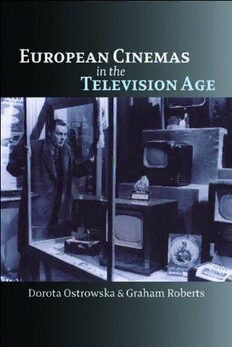
European Cinemas in the Television Age PDF
209 Pages·2007·0.725 MB·English
Most books are stored in the elastic cloud where traffic is expensive. For this reason, we have a limit on daily download.
Preview European Cinemas in the Television Age
Description:
Graham Roberts and Dorota Ostrowska radically rethink European cinema's post-war history from the perspective of television's impact on the culture of cinema's production, distribution, consumption, and reception. In every European country television has transformed the economic, technological, and aesthetic terms of cinema production. Its growing popularity has drastically reshaped cinema's audiences and forced governments to introduce policies to regulate the interaction between cinema and television. Cinematic criticism has been slow to address the impact of television, but this study recognizes its influence and offers a more authentic and richer history of European cinemas.
See more
The list of books you might like
Most books are stored in the elastic cloud where traffic is expensive. For this reason, we have a limit on daily download.
